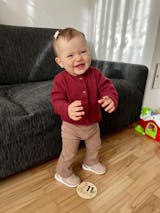Burping a newborn: what is it and when is it necessary?
Parents have always been told how important it is to burp their newborn after eating to help him digest properly.
But are we sure of this?
Small spoiler: burping is NOT always necessary, on the contrary !
In most cases, the baby's need to burp is linked to rapid sucking at the breast or the presence of gastrointestinal problems that cause digestive difficulties, gastric slowdown, reflux or gas colic in newborns.
If your baby suffers from these problems, burping is NOT the solution to these problems.
In fact, the solution is to resolve the irritative and inflammatory picture of the gastrointestinal system which can be PREVENTED (from pregnancy or the first days of life) and/or CURED .
1. What is baby burping?
Burping a newborn is defined as the emission of air from the mouth after feeding.
It may not happen immediately after eating, but may also happen after some time or not at all.
In fact, not all babies need to be burped.
Causes of burping

Babies who need to burp during or after feeding do so for 2 main reasons :
- The baby eats too quickly, is poorly positioned during feeding and swallows air;
- The baby suffers from gastrointestinal problems that cause digestive difficulties, gas in the tummy, milk reflux and slow gastric transit.
In general, if the baby is well and needs to be burped just because he ate a little quickly, he will do it immediately after the feed and it is not always necessary.
If the baby suffers from gastrointestinal disorders and is bothered, burping is louder and often occurs even after feeding.
2. How to understand when the newborn needs to do it?

To understand if the newborn needs to be burped, it is necessary to observe how quickly he drinks the milk and how he digests it.
In fact, if the newborn eats quickly and is uncomfortable during or after feeding, it is very likely that he needs to burp because he has swallowed air and is having difficulty digesting the milk.
In this case, burping can be done immediately after or in between feedings.
To understand if your newborn needs to burp, it will be sufficient to notice if the baby detaches himself from the breast or bottle, gulps down often during feeding, arches his back and/or rolls his head, refusing the milk, or is annoyed after feeding.
In some cases, burping your baby will help him or her to go back to breastfeeding or bottle feeding if he or she is still hungry.
If the baby suffers from reflux or colic, burping will help him relieve himself temporarily but he will continue to have a stomach ache.
3. How to burp a newborn?
There are many tips on the Internet for burping a newborn, but not all of them are correct, on the contrary.
The classic method of picking up the baby, placing him on our shoulder and hitting the baby's back does nothing except jostle him more; furthermore, you risk creating a stiff neck in the newborn (because the parents hold him in their arms with a crooked neck and, often, always on the same shoulder).
Even the sitting position for burping is not correct as it risks causing the baby to have an inclined torticollis and to bend him, crushing the stomach and causing greater difficulties in digestion.
To burp your baby properly, I suggest picking him up after feeding and placing him chest to chest with you.
Be careful to keep it well vertical with your back and not keep it bent or hunched.
When holding your baby, gently stroke his back without patting him vigorously.
The upright position facilitates the rising of the air swallowed by the newborn and helps him to burp on his own.


